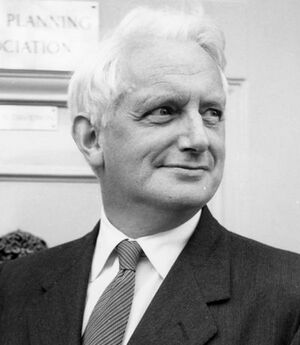Alan S. Parkes
Zur Navigation springen
Zur Suche springen
| Alan S. Parkes | |
|---|---|
| Gelebt | 10. September 1900–17. Juli 1990 |
| Beruf | Wissenschaftler |
Sir Alan Sterling Parkes (1900-1990) earned one of the first undergraduate degrees in agriculture at Cambridge in 1921, where Marshall was his tutor. He completed his Ph.D. in zoology at Manchester University on factors governing the sex ration. In 1923 Parkes moved to the physiology department of the Medical Sciences Faculty, University College, London, the site of some of the most advanced nonreproductive physiological and endocrinological research of the day. And it was this tradition that Parkes took up and directed toward reproductive problems.[1]
Parkes war Vorsitzende der Society for the Study of Fertility and the Zoological Society in London.
| Zitat: | «Es gibt rund eine Million Tonnen überflüssiger Männer allein in diesem Lande.»[2] |
Literatur
- Off-beat biologist: the autobiography of Alan S. Parkes., Cambridge, England : Galton Foundation, 1985
Einzelnachweise
- ↑ Adele E. Clarke: Disciplining Reproduction: Modernity, American Life Sciences, and "the Problems of Sex", University of California Press, 1998, p. 74 (Reproductive issues from sex and contraception to abortion and cloning have been controversial for centuries, and scientists who attempted to turn the study of reproduction into a discipline faced an uphill struggle. Adele Clarke's engrossing story of the search for reproductive knowledge across the twentieth century is colorful and fraught with conflict.
Modern scientific study of reproduction, human and animal, began in the United States in an overlapping triad of fields: biology, medicine, and agriculture. Clarke traces the complicated paths through which physiological approaches to reproduction led to endocrinological approaches, creating along the way new technoscientific products from contraceptives to hormone therapies to new modes of assisted conception--for both humans and animals. She focuses on the changing relations and often uneasy collaborations among scientists and the key social worlds most interested in their work--major philanthropists and a wide array of feminist and medical birth control and eugenics advocates--and recounts vividly how the reproductive sciences slowly acquired standing.
By the 1960s, reproduction was disciplined, and the young and contested scientific enterprise proved remarkably successful at attracting private funding and support. But the controversies continue as women--the targeted consumers--create their own reproductive agendas around the world. Elucidating the deep cultural tensions that have permeated reproductive topics historically and in the present, Disciplining Reproduction gets to the heart of the twentieth century's drive to rationalize reproduction, human and nonhuman, in order to control life itself. Reproductive issues from sex and contraception to abortion and cloning have been controversial for centuries, and scientists who attempted to turn the study of reproduction into a discipline faced an uphill struggle. Adele Clarke's engrossing story of the search for reproductive knowledge across the twentieth century is colorful and fraught with conflict.
Modern scientific study of reproduction, human and animal, began in the United States in an overlapping triad of fields: biology, medicine, and agriculture. Clarke traces the complicated paths through which physiological approaches to reproduction led to endocrinological approaches, creating along the way new technoscientific products from contraceptives to hormone therapies to new modes of assisted conception--for both humans and animals. She focuses on the changing relations and often uneasy collaborations among scientists and the key social worlds most interested in their work--major philanthropists and a wide array of feminist and medical birth control and eugenics advocates--and recounts vividly how the reproductive sciences slowly acquired standing.
By the 1960s, reproduction was disciplined, and the young and contested scientific enterprise proved remarkably successful at attracting private funding and support. But the controversies continue as women--the targeted consumers--create their own reproductive agendas around the world. Elucidating the deep cultural tensions that have permeated reproductive topics historically and in the present, Disciplining Reproduction gets to the heart of the twentieth century's drive to rationalize reproduction, human and nonhuman, in order to control life itself.) - ↑ Alan S. Parkes auf dem CIBA-Symposium vom 26. bis 30. November 1962 in London; zitiert von Th. v. Randow: Gespenstische Visionen: Wissenschaftler diskutieren über die Zukunft des Menschen, Die Zeit am 27. September 1963
Netzverweise
- Christopher Polge: Sir Alan Sterling Parkes. 10 September 1900 -- 17 July 1990: Elected FRS 1933
- Chris Polge: Sir Alan Parkes, CBE, ScD, FRS 1900-1990, Journal of Reproduction and Fertility (1994) 100, 1
- Sir Alan Sterling Parkes: 10 September 1900 - 17 July 1990, [Biogr Mem Fellows R Soc. 2006] - PubMed - NCBI
